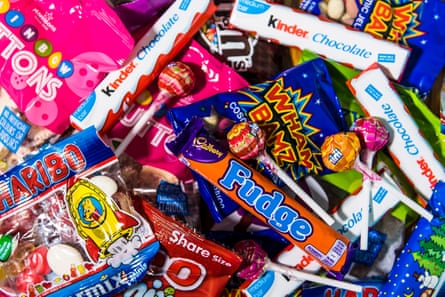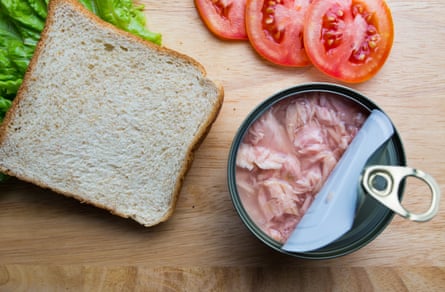Donate tins, treats and toiletries: how to help a food bank | Food banks
donate staples
“Some people go into the run up to Christmas thinking ‘oh that would be a fancy pack of biscuits, that would be nice’ but we need the basics,” says Kathleen Neilly, who runs West Lothian Food Bank. These currently include canned meat and canned vegetables, as well as personal care items such as shampoo and shower gel. She has enough noodles for about a year. Other food banks are reporting ongoing shortages of long-life juices and milk. Check your local grocery bank for the latest shopping lists. Many are part of the Trussell Trust network or can be found through the Independent Food Action Network (IFAN), and many have their own social media accounts.
But also treats

They can make a big difference, says Colchester Food Bank chief officer Mike Beckett, especially treats for kids. “You can explain to an adult how to eat healthy, but it’s harder to explain to a child who is upset and a candy bar might cheer them up. in a crisis [a treat] can relieve parents.” He recommends a multi-pack bag of candy, cookies, or chips, “as long as they’re individually wrapped. We can open them and put something in each package.”
Give can opener
Cans with ring pulls are always welcome, but tend to come from the more expensive supermarkets. “We give people all these cans and they don’t have a can opener,” says Neilly.
Consider more expensive items
“Corned beef wasn’t that expensive and a lot of people donated it, but we’ve seen the price drop massively because of the price,” says Jen Coleman, CEO of Black Country Food Bank. Billy McGranaghan, founder and CEO of Dad’s House, a charity and food bank in London, says they buy cans of tuna and sardines every week to keep supplies going.
Opt for foods that can be eaten cold

Most food banks report that customers are increasingly asking for foods that don’t need to be cooked. Some are concerned with saving energy, but some have no cooking facilities or even a kettle. Pots of instant noodles or porridge that only require hot water are useful. Rajesh Makwana, director of Sufra, a poverty relief group and food bank in north London, says his team is handing out ‘no-cook’ packets. “You’re limited in terms of diet,” he says. “Things like bread and biscuits. No pasta, no rice. We would give some tuna, so you can just open it, stick it on bread and eat it. It’s really minimal stuff.” Neilly keeps a supply of canned sweetcorn that can be eaten cold.
Or that requires minimal cooking
Canned potatoes are versatile and can be cooked in the microwave, and canned dishes such as curries or stews are popular. Neilly isn’t a fan of canned pies, “mainly because they take half an hour in the oven.” But other food banks might welcome them: “A couple of these for a family, with some veggies, is great,” says Coleman.
Avoid anything with alcohol
You’d think a Christmas pudding with brandy would be a treat, but Neilly says, “We’re completely abstaining from alcohol. We don’t know the background of our client.”
Don’t forget personal care items
Everything you need – toothbrushes and toothpaste, deodorant, shower gel, shampoo, toiletries, diapers. McGranaghan says shaving cream is often overlooked. Some food banks give out cleaning products and some don’t, so check.
Check the best before dates
It’s about dignity. “When someone is feeling down and comes to a table, the last thing they want is expired food. It destroys the soul,” says McGranaghan.
Avoid heavy objects
A big bag of rice or pasta might seem cheap, but it can become too heavy in a tote bag of cans when you’re walking or relying on public transportation. Multipacks are fine – they will be separated before delivery.
Find out what your local food bank needs
Alexandra McMillan, founder of Legendary Community Club, a food justice group in south London, says people have been asking for food for their pets, particularly cat and dog food. For Colchester’s Beckett, donations of plastic bags – clean and sturdy – are welcome, and his warehouse manager “loves it when people are there either making a donation or having an online order delivered [straight] to our warehouse”. Follow your local food bank on social media for information on fundraising – from major events to donating raffle prizes.
donate money
This is increasingly helpful to food banks than groceries. They can plan, buy what they need – often in bulk and at better prices than the supermarket, as well as fresh fruit and vegetables – and best meet their customers’ specific needs. Money also covers overheads like rent, fuel costs for vans, and utility bills. Donating prepackaged grocery bags means people are “not given autonomy to make their own decisions,” says McMillan. “Cash has a positive psychological effect.”
Billy McGranaghan estimates he’s lost “90% of cash donations in the last three or four months.” He says Dad’s House welcomes food donations — “we can use anything: we have vegetarians, vegans, people who eat halal, people with intolerances” — but having money means they can help customers top up their prepaid energy meters. “They’re really key to keeping families warm and being able to cook the food that we can give them.”
Help in other ways
Ask your local food bank what else they need. It could be skills, says Makwana: “They might need to set up a website, or some administrative work, fundraising.”
could you help big “A lot of Tafels could say yes if they were offered the use of a warehouse or a building,” says Beckett. “At the moment we have a building that is rent-free, but that will run out and we will have to move.”
Write to your MEP
Finally, question why food banks are even needed. “We ask anyone who would like to donate to a food bank to also write to their local MP demanding urgent action to tackle the growing poverty behind food bank use,” says Sabine Goodwin, coordinator of IFAN – there is a template on hers site . “Food parcels are clearly not solving poverty: it is important that MPs make collective calls on the need to reverse the normalization of food banks in the UK.”